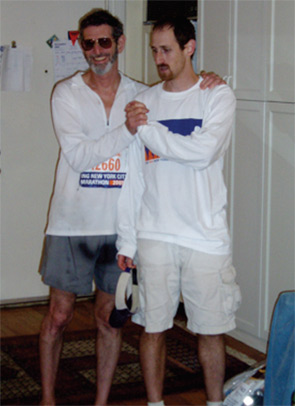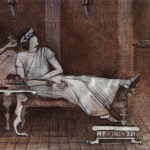
Run for Your Life
Exercise is good for you. Those clichéd jokes about feeling the urge to exercise and then lying down until it passed are tired. The literature is replete with good evidence that regular exercise is salutary for cardiovascular disease (ischemic heart disease, strokes, and blood pressure), psychological and emotional well being, weight control and obesity, noninsulin-dependent diabetes, disability, longevity, osteoporosis, anxiety and depression, and probably cognition and certain cancers.
There’s also good evidence now—accumulated by Jim Fries, Nancy Lane, their colleagues, and me and my colleagues—that running and most recreational exercise does not necessarily lead to osteoarthritis; indeed, reasonable exercise programs are probably good not only for healthy joints but also for certain patients with joint disease.

I’ve been running for nearly four decades. Despite intermittent injuries, I enjoy it and try to complete a marathon each year. In my younger days I raced (see photo at right), but without much competitive success. (My youngest son, David, took up running seriously, was on his high school state championship and collegiate [Williams] NCAA national champion cross-country teams, held school distance records, and now coaches; he must have my wife’s genes.) I looked forward to the day we could go for runs together, when he said “Dad, I’m not a recreational runner, I’m an athlete; besides I can’t run as slow as you do.” We did run the New York City Marathon (his only marathon) “together”— that is, we started together and finished separately—a couple years ago. He was humbled and didn’t quite surpass my best marathon time. My middle son and daughter run casually, sometimes with me, and my dogs run with me. My wife tried running, disliked it, and walks pretty regularly. My latest injury is unilateral buttock pain, which at times is very limiting. It doesn’t seem to be radicular, neurologic, or boney; it is perhaps biomechanical-related muscle (gluteal, pyriformis) tightness/spasm/dysfunction, but it does not respond to anything (e.g., physical therapy, modalities, or medication) except local injections and not running. I welcome any helpful thoughts or suggestions.
Why, or how, then is exercise healthy? What’s the mechanism? There was an interesting report examining the “molecular” signature of exercise.1 Investigators at Massachusetts General Hospital in Boston used targeted liquid chromotagraphy–mass spectrometry (LC-MS) to examine metabolic changes in plasma in response to exercise and to further determine whether metabolites modulated expression of transcriptional regulators. They found enormous changes in plasma indicators of glycogenolysis (glucose-6-phosphate), TCA cycle span 2 expansion (succinate, malate, and fumarate), and lipolysis (glycerol), as well as modulators of insulin sensitivity (niacinamide) and fatty acid oxidation (pantothenic acid) following acute exercise (10 minutes on a treadmill or bicycle and Boston marathon finishers). The changes correlated with fitness. A combination of these metabolites (glycerol, niacinamide, glucose-6-phosphate, pantothenate, and succinate) upregulated in vitro expression of a transcriptional regulator of glucose utilization and lipid metabolism genes in rodent skeletal muscle. These data suggested that exercise led cells to release metabolites that can act on genes regulating glucose and lipid metabolism. Maybe that’s why exercise is good.
